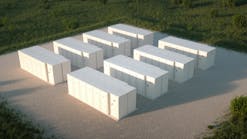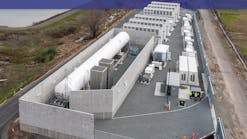How Delta’s Energy Storage Solutions Are Enhancing the Reliability and Stability of the Grid in Taiwan
Taipei, TAIWAN – To combat surging electricity demand and power outages, Taiwanese company Delta Electronics (Delta) is developing energy storage systems to improve power stability through renewable energy storage.
Founded in 1971, the company initially focused on consumer electronics like linear power supplies. Recognizing the need to improve power efficiency, Delta transitioned through various sectors. Today, Delta provides a range of solutions that are designed specifically to facilitate the energy transition for governments around the world. These include energy storage systems and power conditioning systems to support and regulate the power grid, wind and solar inverters to generate renewable energy efficiently, smart meter connectivity solutions for advanced metering infrastructure (AMI), and EV chargers and charging management systems for safe and efficient vehicle charging.
Enhancing the Reliability and Stability of the Grid:
Delta Electronics Corporate Communications Manager Alessandro Sossa, emphasized Delta’s commitment to advancing sustainable energy solutions, stating, “Collectively, our solutions facilitate the deployment of smart grids with distributed renewable energy resources and AMI for the efficient management of demand and supply. They can also improve the efficiency of energy infrastructure while supporting electric transportation in a variety of scenarios, thus advancing the transition to a low-carbon future.”
Regarding the role of energy storage systems, Sossa explains, “As renewable energy systems become more prevalent and are connected to the main grid, energy storage systems will play a vital role in regulating grid frequency. Not only do they provide voltage regulation at the source by smoothing renewable energy and reducing the rate of change to ensure the stable supply of renewable energy to the grid, but they also provide real-time correction by charging and discharging at any time according to changes in grid frequency. Once renewable energy penetration reaches a certain point, effective energy shifting systems need to be in place to balance demand and supply in order to solve the duck curve issue.”
He highlights the transformative impact of effective energy storage systems, noting, “These systems transform renewable energy into a dispatchable and stable source of power, allowing traditional generator units to operate steadily with improved fuel efficiency and lower carbon emissions. Being able to effectively dispatch existing unit capacity and convert it to reserve capacity also means that investment in new generator units can be deferred.”
Delta’s Smart Microgrids:
Delta’s Smart Microgrids are equipped with advanced energy storage solutions and energy management software. These systems include MW-level energy storage units housed in containers, utilizing high-performance batteries capable of rapid energy discharge. This capability enables efficient stabilization of grid electricity supply, particularly in regions such as the islands around Taiwan, which are prone to disruptions from events like typhoons.
With a response time of 0.3 seconds to grid shortages, the power conditioning systems integrate stored energy back into the grid. This approach enhances grid stability and resilience, ensuring reliable electricity supply even under challenging weather conditions. The technology aims to establish smart microgrids that not only improve energy efficiency but also bolster the resilience of local electricity networks against natural disasters.
Delta Completes Taipower's Largest Energy Storage System on Kinmen Island:
Delta has recently completed the installation of Taipower's largest energy storage system on Kinmen Island, marking a significant milestone in Taiwan's energy infrastructure development. This comprehensive solution includes a 1MWh lithium-ion battery energy storage system (BESS), a 2MW power conditioning system (PCS), an energy management system (EMS), and environmental management systems. Designed to enhance grid stability, the system provides rapid backup power within 200 milliseconds of a generator outage and maintains stability during the integration of new infrastructure.
Taipower President Ping-Li Chung praised Delta's role in advancing Kinmen Island's smart grid initiative, stating, "Delta has actively invested in the smart grid field and has demonstrated their capability with this energy storage system. It will play a crucial role in stabilizing our grid and supporting the integration of renewable energy sources."
Delta CEO Ping Cheng highlighted the company's commitment to sustainable energy solutions and smart city development, noting, "It's an honor to participate in establishing Taipower's largest energy storage system for the smart grid demonstration island Kinmen. This system showcases our expertise in energy infrastructure and our dedication to enhancing Taiwan's energy transformation efforts."
Delta's energy storage system not only improves grid efficiency and reliability but also serves as a blueprint for future smart grid projects across Taiwan. The successful implementation on Kinmen Island underscores the importance of innovative energy solutions in modernizing Taiwan's energy infrastructure and supporting its transition towards cleaner and more sustainable energy sources.
A Bright Future for Taiwan:
Looking towards the future, Sossa envisions a shift to microgrids, stating, “Once balance between renewable energy sources and the grid has been achieved, current energy infrastructure will effectively be replaced with microgrids rather than a large power grid. Thus, power infrastructure will become more localized, meaning that any incidents will be localized without affecting the grid as a whole while also ensuring that locally produced renewable energy is consumed more efficiently.”
Discussing residential energy solutions, Sossa asserts, “Ultimately, all buildings will have their own energy storage systems that can supply or secure power by themselves.” He adds, “The pairing of PV and energy storage systems in residential settings is already being rolled out by industry leaders such as Tesla and Shell. Such systems act as emergency backup power supplies, provide support for vulnerable grids, operate as virtual power plants in regional areas, and enable the real-time monitoring of distributed energy.”



